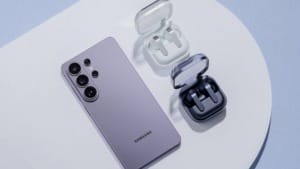Google’s AI glasses may be manufactured in Taiwan, HTC tipped as possible partner
Google’s first AI glasses may be manufactured in Taiwan, with HTC tipped as a strong contender to produce the device.

Google is reportedly finalising the development of its first pair of artificial intelligence-enabled glasses, with Taiwan expected to play a key role in production. The company has yet to confirm its chosen manufacturing partner, though Taiwanese electronics manufacturer Quanta and smartphone and virtual reality specialist HTC have emerged as leading contenders.
Quanta, which was responsible for creating the prototype design, has strong credentials in large-scale electronics manufacturing. However, recent industry speculation suggests HTC may be the preferred choice to produce the device, given its experience with AI-enabled hardware and ongoing ties with Google.
HTC’s expertise and ties with Google
HTC recently introduced its first AI glasses, known as the Vive Eagle, which are fully manufactured in Taiwan. The company has also transferred its augmented reality and virtual reality expertise, along with several non-exclusive licensed patents, to Google for US$250 million. This deal has fuelled speculation that deeper collaboration between the two companies may follow, potentially positioning HTC as a strategic manufacturing partner for Google’s new product.
HTC has a history of working with the US tech giant, having previously sold its Powered by HTC smartphone division to Google for US$1.1 billion. Industry analysts believe securing Google’s glasses contract would significantly benefit HTC, especially as contract manufacturing is no longer a primary focus for the firm. A deal would boost production at its Taoyuan facility near Taipei and strengthen HTC’s operational capacity as it focuses on its own VR, AR, and AI product lines.
The Vive Eagle glasses highlight HTC’s capabilities in this space, being the first to support traditional Chinese voice control. They are also the first branded wearable device to use an open AI architecture, enabling users to customise their AI assistant by selecting models such as Google Gemini or OpenAI’s GPT.
Industry growth and future prospects
Speaking on 21 August, HTC senior vice president Charles Huang confirmed the company’s commitment to expanding AI features through regular software updates, aiming to enhance application scenarios for its devices. Huang noted that, alongside mature AR, VR, cloud computing, and edge-computing technologies, generative AI has created a wealth of innovation opportunities in human-computer interaction.
The smart glasses sector is experiencing rapid growth. Industry data shows global shipments of smart glasses rose by 210 per cent in 2024 compared to the previous year. Analysts forecast a further 60 per cent increase in 2025, with a compound annual growth rate exceeding 60 per cent through 2029. This trajectory reflects increasing demand for wearable AI devices, which are expected to become a key part of mobile technology ecosystems.
As competition intensifies, Google’s entry into the market is expected to shape industry trends and potentially strengthen Taiwan’s position as a hub for advanced technology manufacturing.
















